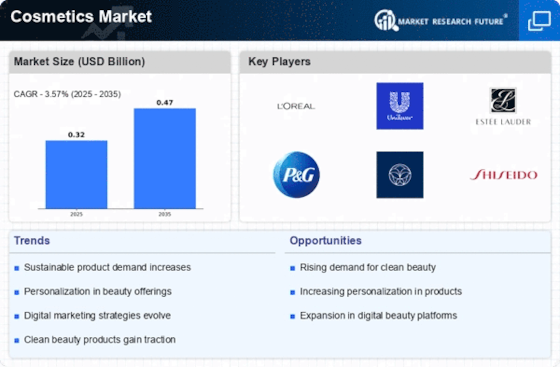Top Industry Leaders in the Cosmetic Products Market

Market share analysis within the Cosmetics industry entails considering crucial factors. Brand reputation, product quality, efficacy, pricing strategies, distribution networks, and marketing campaigns significantly impact market positioning. Brands that excel in offering high-quality, trend-driven cosmetics with broad appeal, catering to diverse consumer needs, secure a competitive edge. Additionally, factors like consumer engagement, brand loyalty, influencer collaborations, and leveraging social media influence market share.
New and emerging companies in the Cosmetics market often focus on niche aspects such as clean beauty, inclusivity, or sustainable practices. These emerging players leverage innovation in formulations, introduce products with natural and organic ingredients, and emphasize sustainability in packaging and manufacturing processes. Moreover, they often rely on digital marketing, e-commerce platforms, and influencer partnerships to gain visibility and compete with established brands.
Industry news in the Cosmetics market revolves around trends, sustainability, and technological advancements. Brands are investing in research and development to introduce products aligned with clean beauty standards, offering vegan, cruelty-free, and eco-friendly options. Additionally, there's a notable emphasis on using sustainable packaging materials, reducing environmental impact, and adopting cruelty-free practices, in line with consumers' increasing awareness and demand for ethical products.
Current investment trends within this market highlight a strong emphasis on sustainability, innovation, and digital strategies. Companies are investing in sustainable sourcing, eco-friendly packaging, and reducing carbon footprints to meet consumer demands for environmentally conscious products. Furthermore, investments in digital marketing, influencer collaborations, direct-to-consumer models, and leveraging data analytics for personalized consumer experiences are prevalent among industry players.
The overall competitive scenario within the Cosmetics market remains dynamic and consumer-driven. Established players face competition from newer entrants focusing on clean beauty, sustainability, and inclusivity. Differentiation through product innovation, formulation quality, packaging sustainability, pricing strategies, and alignment with changing consumer preferences for ethical, diverse, and trend-setting beauty products will determine a company's success and competitive standing in this rapidly evolving market landscape.
Industry News and Investment Landscape:
- Acquisitions in the recent past, such as L'Oréal's purchase of Youthforia, point to market consolidation patterns.
- A future-focused approach is indicated by increased investments in R&D, with an emphasis on biotechnologies, individualized products, and sustainable solutions.
- Consumer preferences and industry growth are further fueled by the growing popularity of short-form video platforms like TikTok, live-streaming commerce, and influencer marketing.
Key Companies in The Cosmetics Market Includes
- The Estée Lauder Companies Inc. (US)
- Procter & Gamble Co. (US)
- L'oréal Group (France)
- Shiseido Co. Ltd. (Japan)
- Beiersdorf AG (Germany)
- Revlon Inc. (US)
- Kao Corporation (Japan)
- Coty Inc. (US)
- Avon Products Inc. (UK)
- Amway Corporation (US)
- Skinfood (South Korea)
- Yves Rocher (France)











